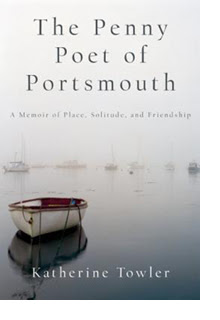Review Series: The Penny Poet of Portsmouth
Originally appeared in ImageUpdate, a publication of IMAGE Journal.
The Penny Poet of Portsmouth: A Memoir of Place, Solitude, and Friendship by Katherine Towler
 “Minor Poets Have More Fun,” read the calling cards of Robert Dunn, the titular character in Katherine Towler’s memoir The Penny Poet of Portsmouth. Towler, who knew this very private writer as much as anyone could, writes: “Robert did not settle for being a minor poet, he aspired to be a minor poet.” Indeed, Dunn earned his nickname for the pocket-sized books of his poetry that he sold for one cent—one cent and no more. He lived out a classic brand of writerly myth in Portsmouth, Maine, surviving on coffee and cigarettes, walking the streets in a “flimsy black trench coat” as he composed poems in his head. In this stubbornly simple life, Towler discerns clues to the purest joys a person can find in writing. Dunn may have eschewed religion, but his “devotion to the word” bears some similarities to the habits of Jesus. He chose freedom from possessions, preferred service over acclaim, paid more attention to the movement of spirit than to social norms. Towler admires the art that resulted from these choices: shrugging off the need for affirmation, giving up the anxious chase for publication, and rather turning toward the gifts of reading and writing itself. In principle, most of us would agree. But in practice, what writer manages this purely? Dunn seems to have come close. He did publish and even served as Poet Laureate of Portsmouth, but did so in a spirit of amused service, his ego “largely absent.” To live an ideal so fiercely has its darker side, too, and Towler recounts it with honesty here. Dunn’s “independent life” and neglect of his health led to Chronic Obstructive Pulmonary Disease and burdened his friends with unasked-for responsibilities and painful decisions. His death left Towler with many questions unanswered and loose ends permanently untied. Even so, the core truth of Dunn’s life stays with her: “The silent mornings spent writing were the times when I was most myself.” Writers craving a reminder of that truth—and the hazards it holds—will benefit from this book at the start of any project, retreat or writing season.
“Minor Poets Have More Fun,” read the calling cards of Robert Dunn, the titular character in Katherine Towler’s memoir The Penny Poet of Portsmouth. Towler, who knew this very private writer as much as anyone could, writes: “Robert did not settle for being a minor poet, he aspired to be a minor poet.” Indeed, Dunn earned his nickname for the pocket-sized books of his poetry that he sold for one cent—one cent and no more. He lived out a classic brand of writerly myth in Portsmouth, Maine, surviving on coffee and cigarettes, walking the streets in a “flimsy black trench coat” as he composed poems in his head. In this stubbornly simple life, Towler discerns clues to the purest joys a person can find in writing. Dunn may have eschewed religion, but his “devotion to the word” bears some similarities to the habits of Jesus. He chose freedom from possessions, preferred service over acclaim, paid more attention to the movement of spirit than to social norms. Towler admires the art that resulted from these choices: shrugging off the need for affirmation, giving up the anxious chase for publication, and rather turning toward the gifts of reading and writing itself. In principle, most of us would agree. But in practice, what writer manages this purely? Dunn seems to have come close. He did publish and even served as Poet Laureate of Portsmouth, but did so in a spirit of amused service, his ego “largely absent.” To live an ideal so fiercely has its darker side, too, and Towler recounts it with honesty here. Dunn’s “independent life” and neglect of his health led to Chronic Obstructive Pulmonary Disease and burdened his friends with unasked-for responsibilities and painful decisions. His death left Towler with many questions unanswered and loose ends permanently untied. Even so, the core truth of Dunn’s life stays with her: “The silent mornings spent writing were the times when I was most myself.” Writers craving a reminder of that truth—and the hazards it holds—will benefit from this book at the start of any project, retreat or writing season.
—Reviewed by June Gervais
Purchase your copy here.